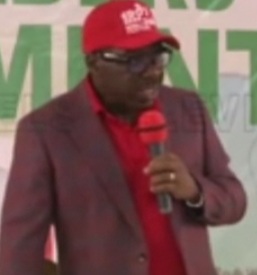▪︎ Obaseki’s comments sad and not factual, says Finance Minister; cautious on financial health

Everyone feels the Punch of the country’s economic downturn, but Nigeria’s Finance Minister, Mrs Zainab Ahmed, nonetheless disagrees with Edo State Governor, Mr. Godwin Obaseki, that N60 billion was printed to augment distributable revenue between the Federal and State Governments.
But she was cautious on the issue of the financial health of the country, which Obaseki, an economist and investment banker, painted a gloomy picture of.
It is, however, instructive that it took Ahmed, who is in the know, seven days to respond to Obaseki’s weighty allegations.
Ahmed’s words when she spoke with journalists in Abuja on Wednesday: “The issue that was raised by the Edo State Governor, for me, is very, very sad. Because it is not a fact. What we distribute at FAAC is a revenue that is generated and in fact distribution (of) revenue is a public information.
“We publish revenue generated by FIRS, the Customs and the NNPC and we distribute at FAAC. So, it is not true to say we printed money to distribute at FAAC, it is not true,” she said.
“What we need to do, as I have said several times, is to improve our revenue to enhance our capacity to service, not only our debt, but to service the needs of running government on day to day basis.
“So our debt currently at about 23% to GDP is at a very sustainable level. If you look at all the reports that you see from multilateral institutions.”
Obaseki said the federal government printed N60 billion as part of federal allocation for March.
Speaking at the Edo State Transition Committee stakeholders engagement last week Thursday, the governor said the economy is no longer what it used to be, adding that the rising debt profile is a cause for concern because dependence on crude oil is no longer sustainable.
Nigeria’s total public debt stock at the third quarter of 2020 rose by N6.01 trillion within a year, according to the National Bureau of Statistics.
The Bureau put the country’s total public debt stock constituting of external and domestic debts stood at N32.22 trillion ($84.57 billion) as of September 30, 2020.
Said Obaseki: “Nigeria has changed. The economy of Nigeria is not the same again whether we like it or not. Since the civil war, we have been managing, saying money is not our problem as long as we are pumping crude oil everyday,” he said.
“So we have run a very strange economy and strange presidential system where the local, state and federal government, at the end of the month, go and earn salary. We are the only country in the world that does that.
“Everywhere else, government rely on the people to produce taxes and that is what they use to run the local government, state and the federation.
“But with the way we run Nigeria, the country can go to sleep. At the end of the month, we just go to Abuja, collect money and we come back to spend. We are in trouble, huge financial trouble.
“The current price of crude oil is only a mirage. The major oil companies who are the ones producing are no longer investing much in oil. Shell is pulling out of Nigeria and Chevron is now one of the world’s largest investors in alternative fuel, so in another year or so, where will we find this money that we go to share in Abuja?”
“When we got FAAC for March, the federal government printed additional N50-N60 billion to top-up for us to share,” he said.
“This April, we will go to Abuja and share. By the end of this year, our total borrowings is going to be within N15-N16 trillion. Imagine a family that is just borrowing without any means to pay back and nobody is looking at that, everybody is looking at 2023, everybody is blaming Mr. President as if he is a magician.”

